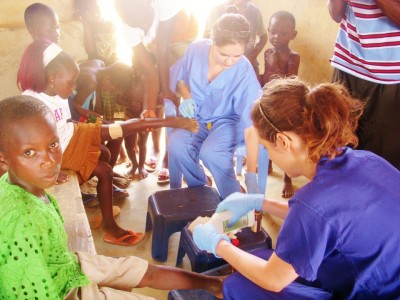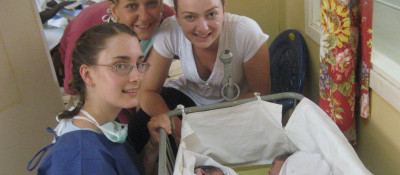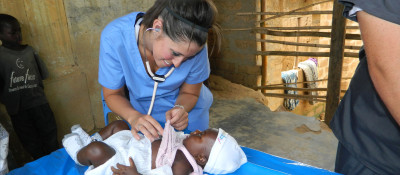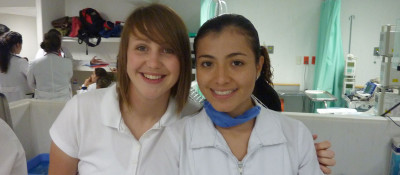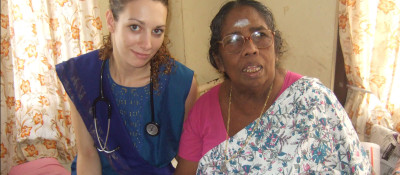Our nursing work experience placements in Ghana are based in regional hospitals in Cape Coast and some smaller district hospitals. We deliberately choose regional hospitals in towns rather than small rural clinics so that you can gain experience in a broad range of departments during your time with us. Many of the hospitals have links with small rural clinics so if your time with us permits, we will also arrange for you to spend time on a rural outreach clinic, usually a rural inoculation programme.
When you arrive, you will meet your project supervisor who will chat to you about your previous experience and objectives. Your supervisor will then organise a programme for you to spend time working with nurses in various wards, or in specific departments depending on which nursing specialty you have selected.
Adult Nursing / General Nursing
If you would like to focus on adult or general nursing, we will place you at one of the regional hospitals on either the Male or Female wards. Malaria will be by far the most common illness you will see, along with other tropical illness such as Typhoid and Hepatitis. As Ghana does not have the same levels of sanitation as we are fortunate to have you will also become experienced in the treatment of intestinal parasites and dysentery.
The rate of HIV and TB infection is also much higher in Ghana than at home. Hospitals in Ghana often have dedicated HIV and TB wards, so you can also gain some useful experience in caring for patients with infectious diseases.
Children’s Nursing
Children’s wards in Ghana are rarely as child friendly or as comfortable as those at home so paediatric nursing placements are also an opportunity to exchange ideas on how children are cared for at home.
Midwifery
If you are looking for an elective in midwifery, we can place you in one of the larger district hospital maternity departments or one of the smaller district or specialist maternity clinics.
Working alongside the Ghanaian midwives, you will be able to monitor the women in the first stages of labour and keep a check of the fetal heart rates with a foetoscope. You will be able to assist the midwives in the deliveries. Following the deliveries, you will help with the monitoring of the women and babies, and help to check the women over before they were discharged.
As malaria is common in Ghana, it can complicate the pregnancy if contracted. Therefore, these placements can provide you with incredible insights into the care of pregnant women with tropical illnesses.
Mental Health Nursing
As well as a number of Regional Hospitals, Cape Coast is also home to a dedicated Psychiatric Hospital, which is the ideal placement for those looking to experience mental health nursing or an elective in mental health nursing.
The hospital has about 250 in patients and 100 out patients and is one of only 3 psychiatric hospitals in Ghana.
Medical Outreach Programme
If your time with us in Ghana permits, we will also arrange for you to attend a medical outreach project. We often take teams of local medics and volunteers to rural village communities outside Cape Coast and to local orphanages and schools to help with health programmes.
Regular outreach projects include inoculation programmes or just health checks, with an opportunity for those in rural communities without access to primary care to come and visit medics for a check up or to discuss any medical problems that they might have.
Costs:
Cost in £
| 2 weeks | 3 weeks | 4 weeks | 5 weeks | 6 weeks |
| £1,395 | £1,595 | £1,795 | £1,995 | £2,195 |
Cost in Euros
| 2 weeks | 3 weeks | 4 weeks | 5 weeks | 6 weeks |
| 1,695€ | 1,915€ | 2,195€ | 2,395€ | 2,640€ |
Cost in US $
| 2 weeks | 3 weeks | 4 weeks | 5 weeks | 6 weeks |
| $1,695 | $1,915 | $2,195 | $2,395 | $2,695 |
Cost in Auz $
| 2 weeks | 3 weeks | 4 weeks | 5 weeks | 6 weeks |
| Au$2,595 | Au$2,895 | Au$3,295 | Au$3,595 | Au$3,995 |
Cost in £
| Extra weeks | Extra months | Language course | Orphanage project |
| £200 | £795 | N/A | £200 |
Cost in Euros
| Extra weeks | Extra months | Language course | Orphanage project |
| 240€ | 900€ | N/A | 240€ |
Cost in US $
| Extra weeks | Extra months | Language course | Orphanage project |
| $240 | $995 | N/A | $240 |
Cost in Auz $
| Extra weeks | Extra months | Language course | Orphanage project |
| Au$360 | Au$1,490 | N/A | Au$360 |
Other Destination Information
[accordion clicktoclose=true scroll=true][accordion-item title="Accommodation"]
During your time with us in Ghana, you will be staying with other volunteers in our house in Cape Coast. It is possible to stay with local families if you prefer but please let us know when you apply.
Whether you are teaching, on the journalism placement or working in hospitals, all the volunteers stay together in the same house which means that you are never too far away from someone to socialise with in the evenings or travel with at weekends. Usually, four to six people will share a room in the accommodation.
The standard of the accommodation will basic (please see the pictures on this page) and not be what you are used to at home so please don’t expect all mod cons, but it will be clean and tidy.
The house has running water and electricity, but please be aware that Ghana’s electricity mostly comes from a massive hydro-electric plant at Lake Volta. It is not unheard of for the electricity company to simply cut supply when water levels in the lake are too low!
There will be someone there to look after the house and they will cook your meals which means that if you can’t quite get used to Ghanaian food then they can cook something similar to what you are used to at home.
Cape Coast is centrally located for all our projects in Ghana. Travelling around this fairly small town is easy whether you are teaching or on a medical project, you placement will be easy to reach by tro-tro (small mini bus) or even by walking.
Our team in Ghana will be on hand during office hours if you have any general queries and only a phone call away outside office hours if there’s something much more urgent.
[/accordion-item][accordion-item title="Location"]
Highlights – Ghana
The cost of the programme in Ghana includes drumming lessons. Music is an integral part of Ghanaian culture so learning a bit about music in Ghana will give you more of an insight into the Ghanaian way of life.
Weekends are free and, depending on how many volunteers are overseas with you, you are based in the same accommodation, which means that you can easily go travelling at weekends. Our location in Ghana means that you are close to some of the Ghana’s most popular attractions.
Kakum national park, home to our conservation projects in Ghana is a short drive away. The forest reserve at Kakum is famous for it’s canopy walkway. Those with a good head for heights can literally walk through the canopy of the rainforest thanks to a walkway that spans the tops of the trees. Those without a head for heights can wander the numerous trails that run through the forest, some that have been renovated by Global Volunteer Projects conservation volunteers.
Also within easy reach is the coast. Great if you just want to chill out and relax by the beach and watch the fishermen land their days trawl. The coast is also home to the colonial forts. Many of the forts were used during the sinister trade of slaves from Ghana and it’s well worth taking the tour around these forts to learn a bit more about Ghana’s colonial past.
Further afield, you can visit the vibrant capital city Accra or fishing villages along the coast. Time it right and you might be lucky enough to visit one of the villages during their annual festivals.
Further north, you can journey to the capital of the Ashanti Empire at Kumasi, visiting the huge market for souvenirs to take home. It’s this market where you’re likely to find the best deals on Ghana’s famous Kente cloth as well as numerous hand carved crafts.
Those with a bit more time on their hands can journey further north to Lake Volta or the game reserve in Mole.
Climate
The Climate in Ghana is hot and humid at most times of the year. Temperatures will regularly reach 30 degrees centigrade during the day and will not drop much below 25-28 degrees at night.
From November the Harmattan winds blow dust from Northern Africa. This usually lasts into January and February. It doesn’t really have much impact on the coastal regions but can make the air dustier than usual and you will find that most things quickly adapt a thin layer of terracotta red dust!
Ghana will see a short period of rain, usually around June followed by longer rains around September or October. The rains are unlikely to be a deluge, most of the time they are a short sharp period of intense rainfall. The rain tends to dampen the dust, clear the air and drop the temperature so it can be quite a pleasant change to the heat and humidity.
Money
You will have weekends free to travel and visit the sights so do take some spending money for food, accommodation and souvenirs.
Exactly how much to take is a matter of great debate but most who have travelled to Ghana recommend that you could probably get by allowing £50-75 per weekend spending money. If you can, take a little extra just in case to allow for emergencies or those ‘must have’ souvenirs.
You cannot get Ghanaian currency outside of Ghana so it’s best to take your spending money as travellers cheques or cash. Credit and debit cards are not widely accepted in Ghana. You can usually draw money out on credit and debit cards from most banks in Ghana but this can be a slow and laborious business.
Travellers cheques are the safest way to carry your spending money to Ghana as they can be easily replaced if lost or stolen. In our experience we’ve found that American Express travellers cheques offer the best service but most travellers cheques are accepted. It’s probably best to avoid ‘Thomas Cook’ travellers cheques as some banks do not accept them.
However, do take a debit or credit card (preferably a Visa card) and some cash with you as travellers cheques are difficult to change (often requiring hours of queuing in banks).
You can take cash as sterling, Euros or US dollars. All are easy to change in Ghana.
Arrival
All international flights arrive in the capital city Accra (airport code ACC), and there are a reasonable number of airlines to choose from. From London, British Airways is often the most convenient, flying direct to Accra every day. From UK regional airports, KLM is also convenient, flying from various UK cities via Amsterdam, again every day. We advise you to shop around, however, as competition is strong and deals change on a daily basis.
[/accordion-item][accordion-item title="Meet The Team"]
Country Director – Eric Essuah
Our office in Ghana is headed by the very experienced Eric Essuah.
Eric has lived in Cape Coast for most of his life and has been arranging projects in Ghana for the last six years. During that time he has built up a number of very strong contacts at hospitals and clinics around the Central Region.
Over the last six years, Eric has built up a wealth of experience arranging worthwhile placements and looking after volunteers when they arrive. Eric is usually the first person you’ll meet at the airport and he does a very good job of helping you get used to life in a new country and very new culture.
Once he’s helped you settle in and find your bearings, Eric is always on hand to help if you’re feeling a little homesick or have any other problems. He’s incredibly approachable and will often go out of his way to make you feel comfortable and to ensure that you get the most out of your time in Ghana.
[/accordion-item][/accordion]
Photos from our projects in Ghana (on Facebook, opens in new tab)
Our Costs Include:
[accordion clicktoclose=true][accordion-item title=”Accommodation”]
Accommodation on your project will be with either local families or in group accommodation. You exact accommodation depends on the number of volunteers and your project.
All accommodation is checked by our overseas staff and host families vetted. If you don’t feel comfortable in your accommodation, do please let us know as soon as possible and our overseas staff will do their best to make you more comfortable.
However, please keep in mind that you will be living in lesser economically developed countries so please don’t expect the same standards as home. Access to running water, electricity and other things that we take for granted WILL be limited but we’ll do our best to make sure you have the best that’s possible.
[/accordion-item][accordion-item title=”Pre-departure briefing”]
Our UK team is on hand to answer any questions that may pop up before you go. Please don’t hesitate to call or email to chat about anything that may be concerning you. You should especially not worry about asking any questions you may consider that we’ll think is stupid. The chances are that we probably asked exactly the same questions before we headed off on our travels!
You will receive pre-departure information that will tell you more about your accommodation and placement. This will arrive about 4 weeks before you depart. We can’t send you this immediately as exactly where you stay depends on the numbers that join us. However, by 4 weeks before you depart we will have a good idea of how many people are joining us and we’ll finalise the details of your accommodation.
[/accordion-item][accordion-item title=”Meeting you at the airport”]
Arriving in a new country for the first time can be quite daunting so our overseas team will be there to meet you with a big sign and even bigger welcome!
[/accordion-item][accordion-item title=”Induction and orientation”]
We think that it’s important to give you a thorough introduction to your new home for the next few months therefore, our overseas team will give you an induction and orientation covering everything you need to know from basic customs to where to change money.
[/accordion-item][accordion-item title=”Support from our overseas staff”]
Our overseas team are not just there to meet you at the airport. They’re also not there to molly cuddle you either. Our overseas team is on hand during office hours to do anything they can to help you get the most out of your experience. You will also be given out of office contact details to be used in the event of emergencies, so please rest assured that in the unlikely event that anything goes wrong, our overseas team will be there to help in whatever way they can.
[/accordion-item][accordion-item title=”Medical placement and donation”]
We have worked carefully to develop links with medical staff at hospitals and clinics in all our partner countries. It takes time for our overseas teams to develop and maintain these links so that we can continue to offer you the best medical experience possible.
We think it’s fair that the hospital should receive something in return for supporting you and Global Medical Projects so part of the project cost includes a donation to your host hospital.
[/accordion-item][accordion-item title=”Food (during week)”]
During your time with us we will make sure that your food is provided. Please note that sometimes this will be provided by your host family and sometimes by your host organisation. Where this is the case it is extremely likely that this food will be local food. Most of the time this will not quite be what we’re used to and can take some time to get used to. Rest assured it will be hygienically prepared and nutritious but it will be difficult for them to prepare foods which you are used to at home.
We’re sure that for most of you, eating the local food is part of the experience. If you don’t like the food, we urge you to try to persevere. Ultimately, if you are just not enjoying the experience we will do our best to make alternative arrangements. Please keep in mind however, that the availability of western foods maybe extremely limited and/or expensive so it may not always be possible to change things that much!
Most people elect to go travelling at weekends, so food isn’t always available at this time, particularly in those locations where we have our own accommodation as we often give the cooks the weekend off.
[/accordion-item][/accordion]
Not Included:
[accordion tag=h3 clicktoclose=true][accordion-item title=”Flights”]
We’re not a travel company, and as such we do not arrange flights. However, we can help you to make the necessary arrangements and suggest people to speak to.
Additionally, many people join us as part of a world trip so it’s often easier for you to arrange your travel as part of a round the world ticket.
Don’t hesitate to contact us if you would like help arranging your flights.
[/accordion-item][accordion-item title=”Insurance”]
As many people join us as part of a world trip, we do not include insurance as part of the projects. However, we are happy to introduce good companies that can provide you with excellent and affordable cover.
[/accordion-item][accordion-item title=”Spending Money”]
You will need additional spending money for travel to work, weekend excursions and gifts. Exactly how much to take is a matter of great debate but contact us and we’ll be happy to give you a rough guideline on how much you will need.
[/accordion-item][accordion-item title=”Visas”]
Many of the destinations require you to purchase a visa. We can arrange the visas for you but this will be an additional cost of up to £100.
[/accordion-item][accordion-item title=”Inoculations”]
Most of our countries will require you to be inoculated against diseases that have been eradicated at home. We can advise on which inoculations you will need but will encourage you to visit your doctor or a local travel clinic where they will discuss the best vaccinations for you.
Some of these vaccinations will incur costs so budget accordingly.
[/accordion-item][accordion-item title=”Food during weekend or independent travels”]
We’re happy to provide food when you are on a projects with us or staying in our accommodation but when travelling you will need to buy your own food. In most countries good local food is incredibly cheap. Western food is a luxury and is priced accordingly!
[/accordion-item][/accordion]

